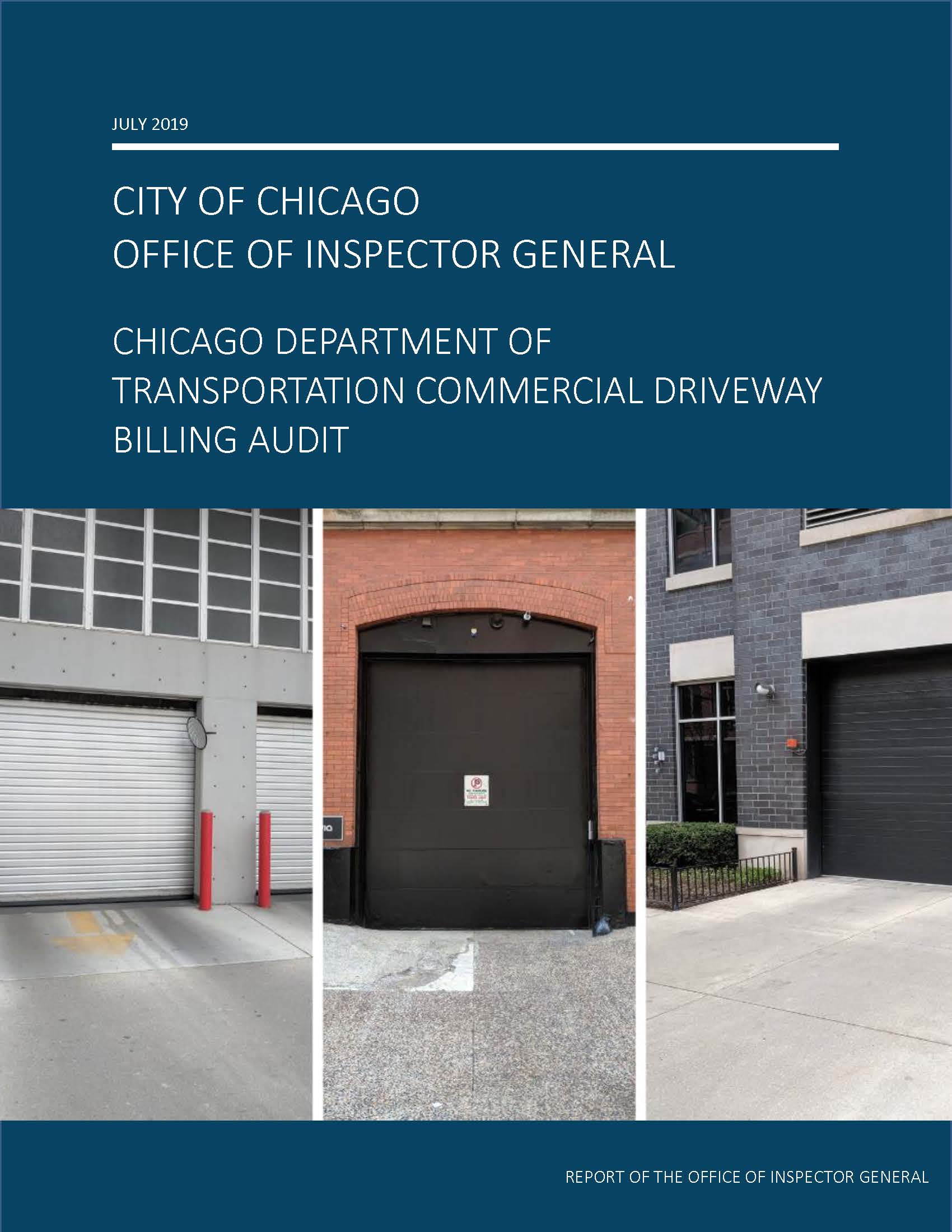Chicago Department of Transportation Commercial Driveway Billing Audit
Summary
The City of Chicago Office of Inspector General has completed an audit of the Chicago Department of Transportation’s billing process for commercial driveway permit annual fees. The purpose of the audit was to determine whether CDOT accurately and completely billed commercial property owners for driveways that use the public way.
Executive Summary
The City of Chicago Office of Inspector General (OIG) conducted an audit of the Chicago Department of Transportation’s (CDOT) billing process for commercial driveway permit annual fees. The purpose of the audit was to determine whether CDOT accurately and completely billed commercial property owners for driveways that use the public way.
- CONCLUSION
OIG concludes that the City is losing over $1 million a year due to incomplete and inaccurate billing.
- FINDINGS
OIG found that CDOT either did not bill, or inaccurately billed, an estimated 6,713 permitholders, resulting in annual revenue loss between $1.1 million and $1.5 million. If collected, this would increase driveway permit revenue by 39%-54%.
The most common reason CDOT did not bill for annual driveway permit renewals was that the identity of the property owner was either unknown or disputed, and CDOT had not researched and resolved the ownership question. OIG identified a variety of other reasons why some permits went unbilled, including missing addresses and unwarranted waivers. Notably, we found similar problems, including incomplete data, in our 2015 audit of CDOT’s Loading Zone and Residential Disabled Parking Sign Processes.
In response to that audit, CDOT stated that it intended to work with the Department of Innovation and Technology (DOIT) to upgrade to a new system in 2016. That upgrade has not yet occurred, and the City continues to lose millions of dollars each year.
In addition, CDOT has no confidence that all relevant driveways are recorded in its current driveway permit system. The City is thus likely forgoing an unknown amount of additional revenue by not billing all relevant property owners.
Finally, OIG found that the City does not actively pursue payment for driveway permit fees that are past due. There were at least 11,561 active permits with $3.8 million in overdue fees in CDOT’s records. CDOT stated that it had previously considered tying driveway permits to the permitholder’s deed, water bill, driver’s license, or business license, but that these ideas had not “gained traction.” The Department of Finance stated it does not include driveway permit fees in the City’s standardized debt collection processes because CDOT’s property ownership data is unreliable. This has created a self-perpetuating cycle; the errors in CDOT’s ownership records prevent the Department from using existing City processes to correct its ownership records. CDOT stated it had previously considered obtaining property ownership data from Cook County, but that the data was “not easy to acquire” and required payment.
- RECOMMENDATIONS
OIG recommends that CDOT correct the data problems currently hampering billing and implement procedures to prevent such problems in the future. Specifically, OIG recommends that CDOT,
- remove or consolidate database fields, as well as options within those fields that are redundant, rarely used, or unnecessary;
- identify and record driveways missing from its records;
- collaborate with DOIT to upgrade its system and include features to prevent future data problems;
- document standardized procedures related to the driveway permitting, billing, and monitoring processes; and
- develop monitoring tools, such as automated reports and/or notifications, to detect permits at risk for inaccurate billing or non-billing.
Finally, we recommend that CDOT collaborate with the Department of Finance, the Department of Law, and other departments as necessary to include driveway permit fees in the City’s standardized debt collection or verification processes.
- CDOT RESPONSE
In response to our audit findings and recommendations, CDOT stated that, in collaboration with DOIT, it will migrate driveway data from the NSR/Suntrack system to the Infor Public Sector (IPS) system, formerly known as Hansen. During that transition CDOT will have “an opportunity to evaluate how it processes and monitors driveway data, including implementing the corrective and preventive measures described in [this report].” CDOT also committed to reviewing and correcting unbilled and inaccurately billed driveway records, assessing current workflow processes, developing standardized policies and procedures for both the NSR/Suntrack and IPS systems, providing training to staff, and developing monitoring reports. Regarding the pursuit of payment for past-due driveway permit fees, CDOT stated it would collaborate with the Departments of Finance and Law to determine the most effective method for collecting past due fees.
The specific recommendations related to each finding, and CDOT’s response, are described in the “Findings and Recommendations” section of this report.
Subscribe to the OIG Bulletin to get notified about future publications.

